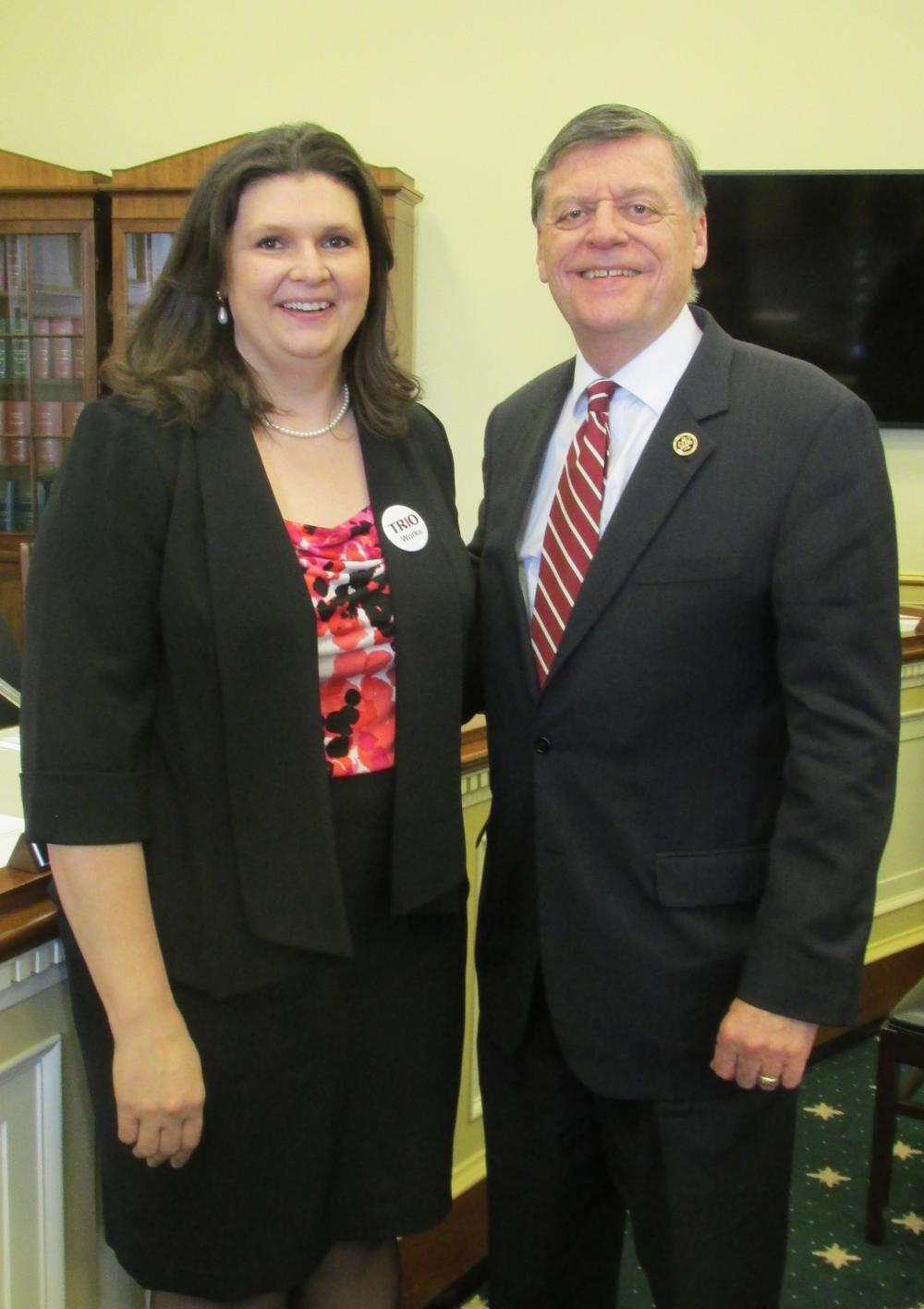Earning a higher education degree can be a major obstacle for a student with a disadvantaged background.
Like a rags-to-riches type of story in an educational sense, Dr. Carol Fischer, an alumna of the McNair Post Baccalaureate Achievement Program at East Central University, accomplished it and was able to share her story back in March in front of the Labor, Health and Human Services and Education Appropriations Subcommittee in Washington D.C.
U.S. Congressman Tom Cole, of Oklahoma, is chairman of the subcommittee as he presented Fisher and four other speakers. Evelyn Martin, director of ECU’s Educational Opportunity Center, attended the hearing.
The oversight hearing entitled “Closing the Achievement Gap in Higher Education,” included Fisher as a featured witness. She shared her personal story of overcoming a lack for a formal education to earn a doctorate degree in oral microbiology, thanks to the academic and social supports provided by TRIO, a federal program which increases access to higher education for economically disadvantaged children.
Fischer shared her pursuit of an undergraduate degree, which began in 2002 at ECU, battling through a non-traditional high school education scenario and juggling the responsibilities of being a single parent with two school-aged children and a job.
Thanks to discovering a first-time love for science while attending a general zoology class, along with encouraging professors and the Ronald E. McNair Program at ECU, Fischer was able to take off, earning a bachelor’s degree in biology at ECU in 2007 and ultimately obtaining a Ph.D. in oral science from the University of Iowa in 2013.
That general zoology class, during her third semester, ignited a passion in Fischer, who changed her major to biology at the end of that term. Professors then encouraged her into pursuing a graduate degree in the biological sciences and how the Ronald E. McNair Program, under the TRIO umbrella, could help navigate her through that process.
“I applied to the program and was amazed to find myself as a part of this close-knit family shortly afterward,” said Fischer in her testimony to the subcommittee. “The McNair office became my home base for the remainder of my time at East Central University and it literally changed my life.”
Fischer says the McNair staff became like a family, being her biggest cheerleaders and providing support and experience like none she had ever experienced. According to Fischer, the family atmosphere spilled over with the fellow students as well with classwork support or any crisis that may have arisen.
“This family even ‘adopted’ my boys and looked out for all of us,” Fischer said. “In addition to providing a close-knit, family-style group, the McNair program also supported me in other ways that made the process more doable for a single mom, struggling with a lack of time and finances – things like free printing, help with class registration, career counseling, tutoring services, college visits and interviews were lifesavers.”
According to Fischer, opportunities enabled her to pursue research and teaching avenues that most influenced the direction her life would take.
“Through participation in a research project at the Kerr Environmental Research Center, working in a Kerr laboratory throughout the last few years of school and the completion of an undergraduate thesis project, I discovered a love of research I would have never found otherwise,” said Fischer. “Additionally, by participating in a teacher assistantship two semesters, I also discovered a passion for teaching and sharing knowledge with others.”
Research and Teaching were the main driving factors in Fischer pursuing a graduate degree.
“I can truly say that the McNair program at East Central University played a very large role in the direction my life has taken and I would not be where I am today without their help and support,” Fischer said. “They believed in me when I did not know how to believe in myself. They saw potential in me long before I could see it myself and encouraged me to strive for that potential. Because of the program and few dedicated professors I was well prepared for admittance into a doctoral program at the University of Iowa.”
ECU’s McNair Program is under the direction of Pat Sutton.
Fischer currently works as a post-doctoral research fellow at the Dows Institute for Dental Research at the University of Iowa.
“Minorities and children from low-income families are less likely to attend college compared to their white and wealthier counterparts,” said Rep. Cole. “Additionally, entering college does not guarantee success. Students from these same groups are also less likely to persist in higher education and eventually obtain a degree. While the cost of higher education is certainly a factor, it’s not the only factor. Often, these students lack a network of family and friends who have attended college and are familiar with the ins and outs of applying for aid, choosing classes and preparing for a career after graduation.”
Cole says the federal government can play a role in helping disadvantaged students to be successful in higher education. A more educated populace strengthens the workforce and international competitiveness of the U.S., Cole explained. Individuals who complete their course of study and obtain a degree are more likely to be employed and earn more than their counterpart who didn’t do so.
“The Department of Education’s loan and grant programs make higher education a possibility for millions of Americans,” Cole said. “But programs such as TRIO and GEAR UP help students to make use of these financial resources. Through these programs, the federal government partners with states, school district, institutions of higher education, nonprofits and private industry to help disadvantaged students prepare for, enroll in and complete a higher education. This preparation is essential to helping these students make us of financial aid.
-ECU-

